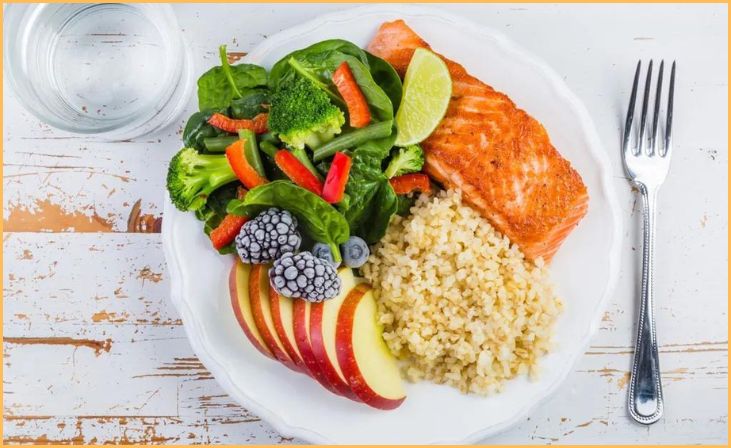Welcome to our comprehensive guide on “Top 8 Healthy Eating Tips for Seniors,” where we explore key strategies to enhance the well-being of our older loved ones through mindful nutrition. As individuals age, dietary needs evolve, making it crucial to adapt eating habits for optimal health. In this blog, we delve into practical advice on incorporating nutrient-rich foods, maintaining hydration, and addressing specific nutritional concerns common in the senior population.
From the importance of balanced meals to tips on managing portion sizes, join us on a journey to empower seniors with the knowledge and tools needed to make informed and health-conscious choices. Let’s embrace the benefits of a wholesome diet to promote vitality, support immune function, and foster overall longevity for our cherished elders.
Healthy Eating Tips for Seniors
Unlock the secrets to vibrant aging with our “Healthy Eating Tips for Seniors” guide. Discover practical strategies for nourishing your body and promoting overall well-being in your golden years. From nutrient-rich choices to mindful eating practices, empower yourself with insights tailored to senior nutrition.
1. Be Mindful of Sugar Intake

Being mindful of sugar intake is crucial for seniors, as excessive sugar consumption has been linked to various health issues, including diabetes and heart disease. Seniors are often more susceptible to these conditions, making it essential to monitor their sugar intake closely. Opting for natural sources of sweetness, such as fruits, and choosing whole foods over processed ones can help regulate blood sugar levels.
Additionally, reading food labels can aid in identifying hidden sugars. This mindful approach not only supports better blood sugar control but also contributes to overall well-being, reducing the risk of chronic health issues commonly associated with high sugar intake. Encouraging seniors to savor the sweetness of whole foods while minimizing added sugars is a simple yet impactful step towards maintaining a healthy and balanced diet in their later years.
Also Read- 7 Healthy Snacks for Toddlers: Nourishing Little Ones
2. Eat a Variety of Nutrient-Dense Foods
Consuming a variety of nutrient-dense foods is paramount for seniors to meet their changing nutritional needs. As aging bodies require fewer calories, every bite becomes an opportunity to maximize nutritional value. Prioritizing fruits, vegetables, lean proteins, and whole grains ensures seniors obtain essential vitamins, minerals, and antioxidants vital for overall health. These nutrient-dense foods contribute to maintaining bone health, supporting immune function, and sustaining energy levels.
Encouraging a colorful and diverse plate not only enhances the dining experience but also provides a broad spectrum of nutrients necessary for healthy aging. This approach not only helps seniors meet their nutritional requirements but also aids in preventing deficiencies and promoting optimal well-being. Embracing a varied and nutrient-rich diet can be a cornerstone for seniors seeking to proactively manage their health and vitality.
3. Prioritize Calcium and Vitamin D
Prioritizing calcium and vitamin D is crucial for seniors, especially as they are more susceptible to bone-related issues such as osteoporosis. Calcium is essential for maintaining strong bones and teeth, while vitamin D aids in its absorption. Seniors often face challenges in synthesizing vitamin D from sunlight and absorbing calcium efficiently. Incorporating dairy products, leafy greens, fortified foods, and supplements if necessary, helps meet these needs.
Adequate calcium and vitamin D intake not only supports bone health but also plays a role in muscle function and immune system regulation. As bones become more vulnerable with age, making a conscious effort to prioritize these nutrients becomes a proactive step in preventing fractures and maintaining overall skeletal integrity, contributing to a healthier and more active lifestyle for seniors.
4. Choose Lean Proteins
Selecting lean proteins is a key aspect of a healthy diet for seniors. As individuals age, maintaining muscle mass and promoting heart health become paramount. Lean protein sources, such as poultry, fish, beans, and tofu, offer essential amino acids without excessive saturated fats. These proteins aid in preserving muscle mass, supporting immune function, and promoting overall well-being. Reducing intake of processed and fatty meats while incorporating lean protein options helps manage cholesterol levels and lowers the risk of cardiovascular issues.
Seniors can benefit from incorporating a variety of lean proteins into their meals, fostering better overall health and contributing to sustained energy levels. Prioritizing these protein choices aligns with the unique dietary needs of seniors, promoting optimal nutrition for a more active and vibrant lifestyle in their later years.
5. Stay Hydrated

Staying hydrated is a fundamental and often overlooked aspect of senior health. Adequate water intake is essential for various bodily functions, including digestion, temperature regulation, and joint lubrication. Dehydration can lead to issues like urinary tract infections and exacerbate existing health conditions. Seniors may experience a reduced sense of thirst, making it crucial to be mindful of fluid intake.
Encouraging regular sips of water throughout the day, incorporating hydrating foods like fruits and vegetables, and limiting dehydrating substances like caffeine contribute to maintaining proper hydration levels. Monitoring urine color can serve as a simple indicator of hydration status. Prioritizing hydration supports cognitive function, joint health, and overall well-being, making it a foundational element for seniors aiming to maintain their vitality and quality of life.
6. Consume Adequate Fiber
Consuming an adequate amount of fiber is vital for seniors to support digestive health and overall well-being. As the digestive system tends to slow down with age, incorporating fiber-rich foods such as whole grains, fruits, vegetables, and legumes can prevent constipation and promote regular bowel movements. Fiber also aids in managing cholesterol levels and controlling blood sugar, contributing to heart health and diabetes prevention—common concerns for seniors. Additionally, a high-fiber diet can help maintain a healthy weight and reduce the risk of chronic conditions.
Encouraging seniors to include a variety of fiber sources in their meals not only supports optimal digestion but also contributes to sustained energy and a greater sense of fullness, fostering a well-rounded and health-conscious approach to nutrition in their later years.
7. Limit Sodium Intake
Limiting sodium intake is crucial for seniors to promote heart health and manage blood pressure. High sodium levels can contribute to hypertension and increase the risk of cardiovascular issues, which become more prevalent with age. Seniors are often more sensitive to sodium, and excessive intake can lead to fluid retention and strain on the cardiovascular system. Encouraging the use of herbs, spices, and other flavor-enhancing alternatives in cooking, while reducing reliance on processed and packaged foods, helps control sodium intake.
Reading food labels and choosing low-sodium options further supports this effort. By adopting a mindful approach to sodium consumption, seniors can contribute to maintaining optimal blood pressure levels and reduce the risk of heart-related complications, fostering a heart-healthy lifestyle in their golden years.
8. Practice Portion Control

Practicing portion control is a valuable habit for seniors to manage caloric intake and support overall health. As metabolism naturally slows with age, consuming appropriate portion sizes helps prevent weight gain and associated health issues. Using smaller plates, paying attention to hunger and fullness cues, and avoiding oversized servings can contribute to maintaining a healthy weight. This approach also aids in digestion and prevents discomfort.
Seniors benefit from savoring meals mindfully and being aware of portion sizes, ensuring they receive the necessary nutrients without overloading their bodies. By adopting a balanced and controlled approach to portion sizes, seniors can enjoy a satisfying and health-conscious relationship with food, promoting longevity and well-being in their later years.
For More- 10 Healthy Fall Harvest Dinners You’ll Make All Autumn Long
Conclusion
In concluding our exploration of the “Top 8 Healthy Eating Tips for Seniors,” we recognize the significance of tailored nutritional choices in promoting well-being during the golden years. By embracing mindful practices like portion control, choosing nutrient-dense foods, and staying hydrated, seniors can empower themselves to lead active, vibrant lives. These tips not only address specific needs associated with aging but also foster a positive and enjoyable approach to food. Remember, a balanced and health-conscious diet is a cornerstone for aging gracefully, supporting both physical and mental vitality.
FAQs
Tailor the diet to specific restrictions, opting for alternatives and flavorful substitutes. Consulting with a healthcare professional or a registered dietitian can provide personalized guidance.
Supplements may be recommended to address specific deficiencies, but obtaining nutrients through a well-balanced diet is ideal. Consult with a healthcare provider to determine individual needs.
Explore simple recipes, utilize pre-cut or pre-packaged ingredients, and consider batch cooking to have healthy, ready-to-eat meals available. Incorporate items like salads, smoothies, and easy-to-prep proteins.







